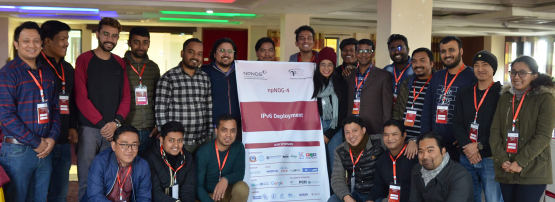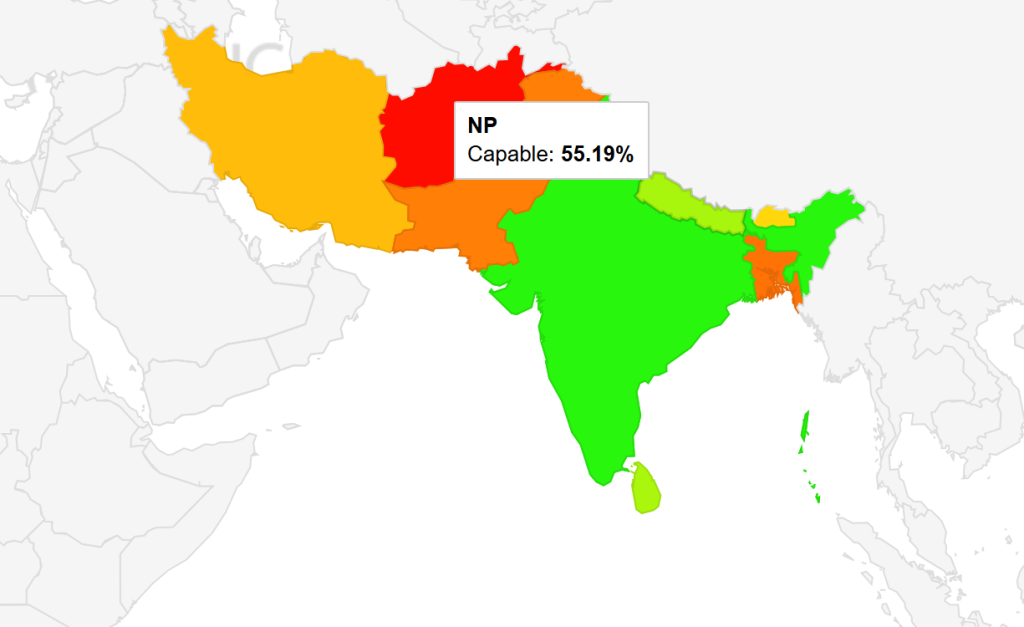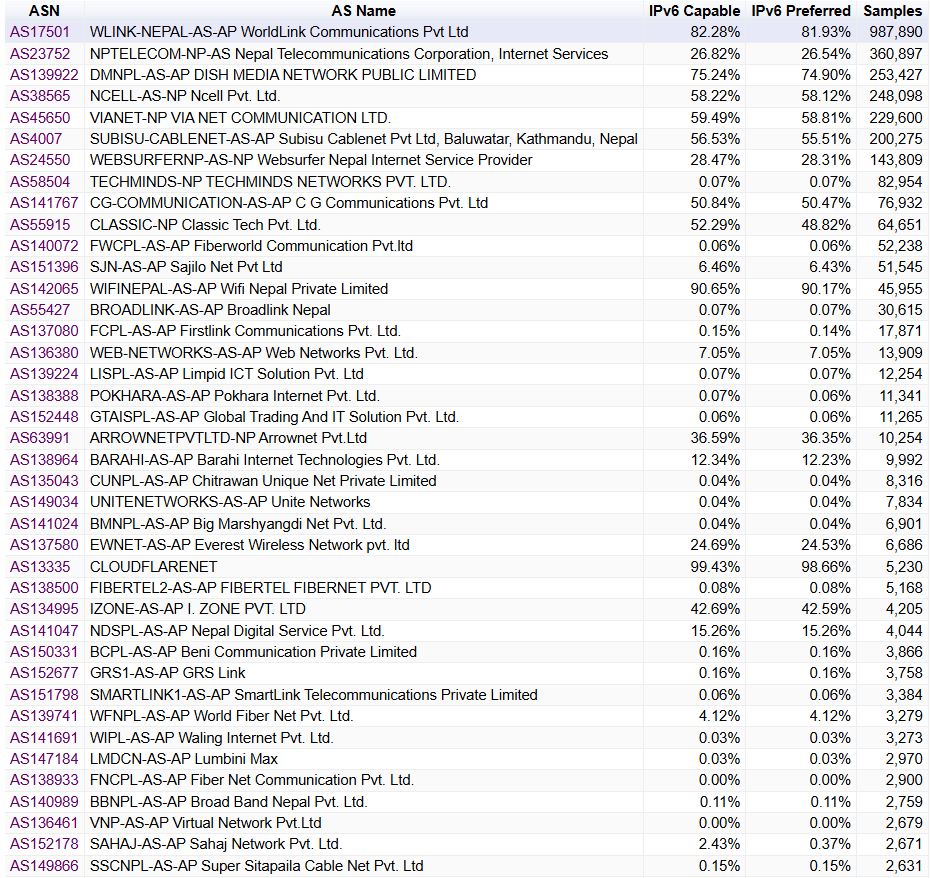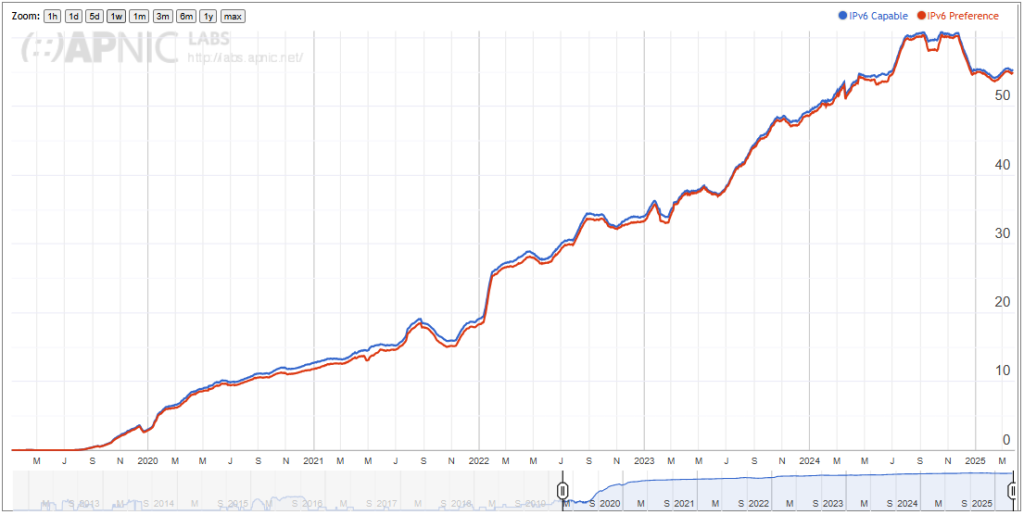
One of the most important aspects of Nepal’s evolving Internet landscape is the adoption of IPv6. The depletion of the available IPv4 address pool and increasing Internet demand with 5G rollout and IoT expansion are the primary causes. Nepal has achieved significant progress in adopting IPv6 in recent years. This post will explore the progress, challenges, and outlook of IPv6 in Nepal.
IPv6 adoption has steadily expanded among government organizations, businesses, and Internet Service Providers (ISPs), enhancing the scalability, security, and efficiency of Internet communications. Recent data indicates that several of Nepal’s largest ISPs have made significant strides in enabling IPv6 for their customers.

Current state of IPv6 in Nepal
Nepal’s IPv6 adoption is progressing steadily, with several major ISPs making significant advancements. According to the latest statistics from multiple Autonomous System numbers (ASNs), WorldLink Communications (WLINK-NP) leads the way with 82.28% IPv6 capability across 987,890 samples, reflecting a strong commitment to next-generation networking.
Similarly, WiFi Nepal (WIFINEPAL-AS-AP) has demonstrated an impressive 90.65% IPv6 capability, further reinforcing the shift towards IPv6 adoption. Other key ISPs, including Classic Tech (52.29%), Dish Media Network (75.24%), and Vianet Communications (59.49%), are also making substantial contributions, driving Nepal’s transition towards a more scalable and modern Internet infrastructure.

Room for growth
The data also reveals significant variation in IPv6 deployment across Nepal. Many ASNs report considerably lower IPv6 capability and preference percentages.
Despite being a major player in Nepal’s telecom sector, Nepal Telecommunications Corporation (AS23752) shows only 26.82% IPv6 capability and 26.54% IPv6 preference. In contrast, NCELL (AS38565), another key mobile provider, demonstrates a 58.12% IPv6 preference and 58.22% capability. This suggests substantial room for improvement in IPv6 adoption within these critical networks.
A considerable number of smaller ISPs have IPv6 adoption rates below 1%, underscoring the need for greater awareness, education, and support. Enhancing resources and guidance for these providers will be crucial in accelerating IPv6 deployment across Nepal.

Achieving widespread IPv6 adoption in Nepal
Despite promising progress, Nepal faces several hurdles in fully transitioning to IPv6. These include:
- Legacy infrastructure – Many older network devices are in use in Nepal, and software lacks IPv6 support, necessitating costly upgrades.
- Lack of awareness and training – Network engineers and administrators require more exposure to IPv6 configuration, security, and troubleshooting.
- Dual-stack complexity – Operating both IPv4 and IPv6 (dual-stack) demands additional resources, making the transition challenging for some ISPs.
- End user adoption – Many users and businesses remain reliant on IPv4, slowing the full transition to IPv6.
To accelerate IPv6 adoption, collaboration between ISPs, government agencies, and industry stakeholders is essential. Suggested key steps include:
- Expanding IPv6 training and certification programs for network engineers.
- Implementing government policies that mandate IPv6 adoption in public networks.
- Promoting IPv6 deployment in enterprises and educational institutions to drive demand.
- Strengthening IPv6 security practices to mitigate potential risks.
By addressing these challenges and encouraging a collaborative approach, Nepal can achieve a more widespread transition to IPv6.
APNIC Academy IPv6 Certification (Associate) ALPHA Trial
To strengthen IPv6 expertise in the region, APNIC launched the IPv6 Certification (Associate) — Alpha Trial, offering free certification in Nepal. The five-day bootcamp combined theory with hands-on training, covering IPv6 addressing, headers, routing, and transition techniques. This trial concluded with 33 new certified IPv6 practitioners and ambassadors in Nepal. The Beta Trial continues this certification in Bangladesh and Thailand this year.
npNOG’s role in IPv6 training and awareness
The Nepal Network Operators’ Group (npNOG) has been instrumental in advancing IPv6 adoption through its training programs and workshops. npNOG regularly conducts hands-on technical sessions on IPv6 deployment, network automation, and security. These workshops bring together network engineers, ISPs, and industry professionals, providing them with practical knowledge and best practices for IPv6 implementation. By providing a collaborative learning environment, npNOG has played a key role in developing local expertise and promoting broader IPv6 deployment across Nepal.
The future of Nepalese IPv6
IPv6 is now essential for Nepal’s growing digital economy, not just a future consideration. Although significant progress has been made, full IPv6 adoption will require continued efforts from ISPs, regulatory bodies, npNOG, and network professionals. With the right regulations, training, and industry collaboration, Nepal can achieve widespread IPv6 adoption, ensuring a scalable, secure, and future-ready Internet infrastructure.
Kijush Maharjan is the Principal Network Engineer at WorldLink Communications and the founder and Secretary of npNOG. He is recognized as an IPv6 pioneer in Nepal.
The views expressed by the authors of this blog are their own and do not necessarily reflect the views of APNIC. Please note a Code of Conduct applies to this blog.
